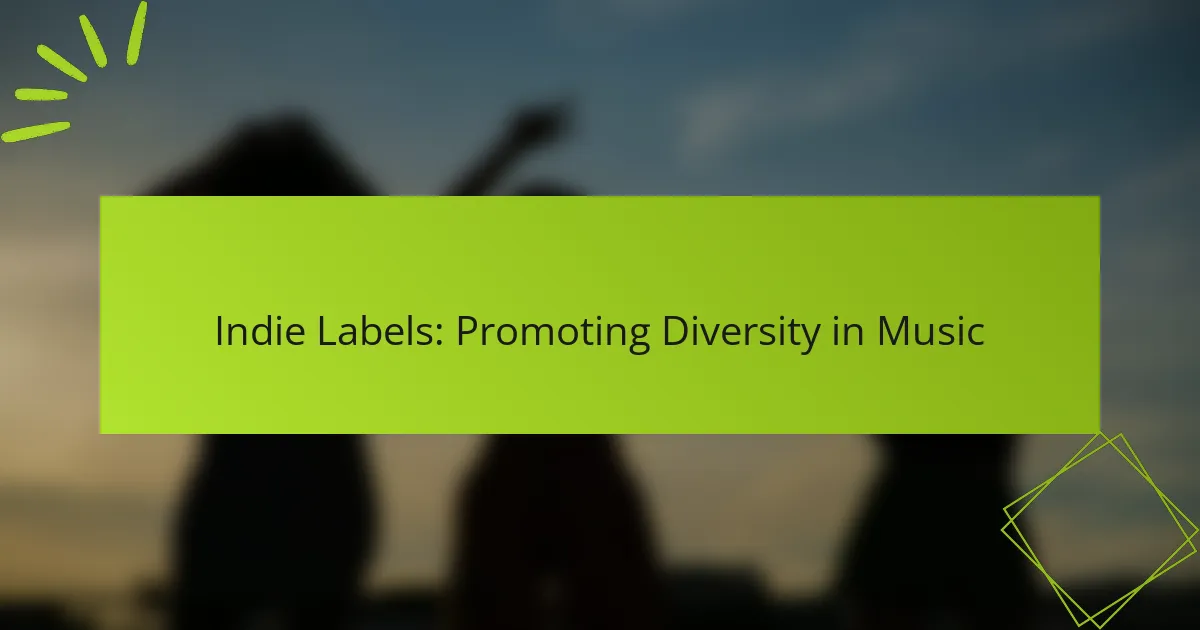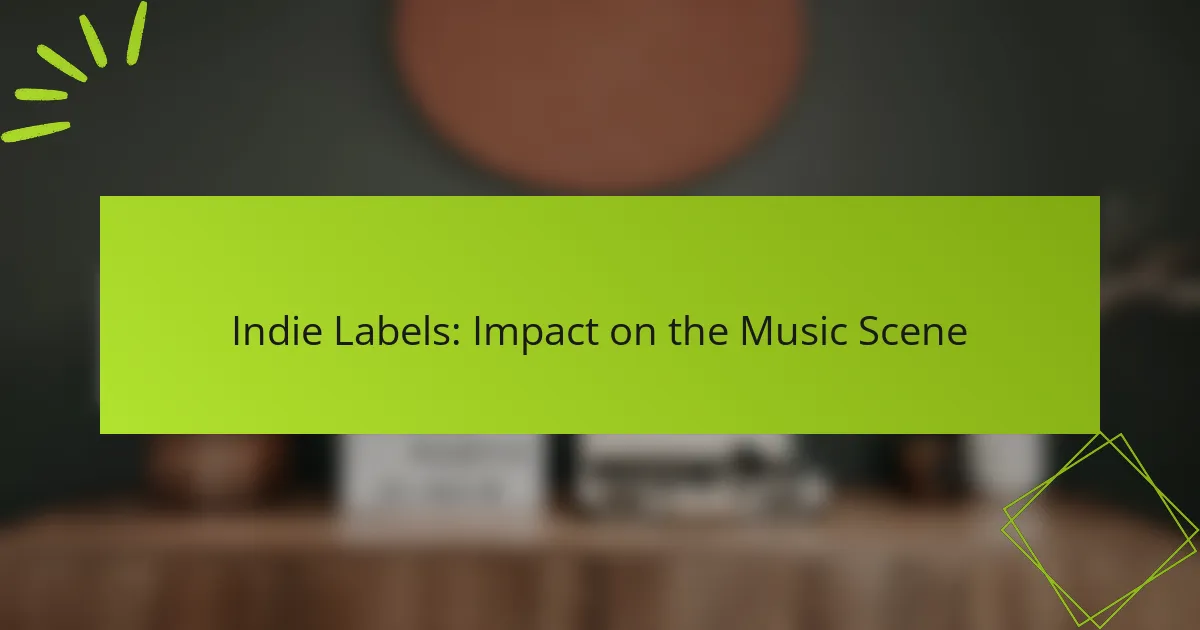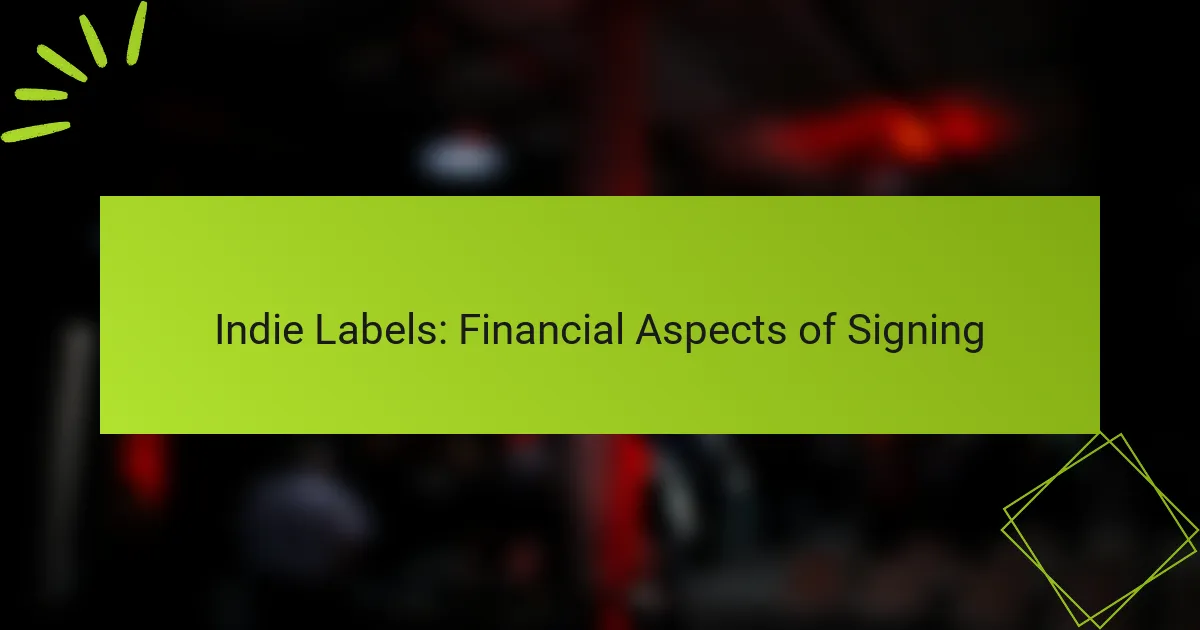Indie labels play a crucial role in promoting diversity in music by championing underrepresented artists and embracing a multitude of genres. Their commitment to inclusivity fosters a vibrant music scene that reflects diverse voices and experiences, ultimately enriching the industry as a whole.
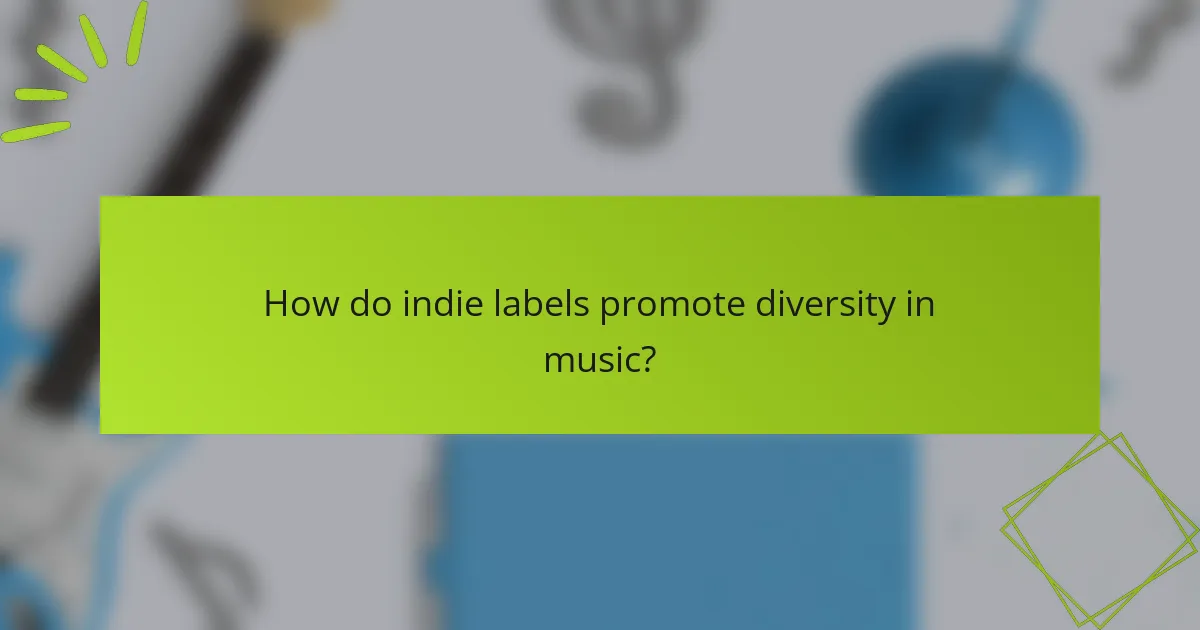
How do indie labels promote diversity in music?
Indie labels promote diversity in music by actively supporting underrepresented artists, showcasing a variety of genres, and engaging with local communities. These efforts create a more inclusive music scene that reflects a broader range of voices and experiences.
Support for underrepresented artists
Indie labels often prioritize signing artists from marginalized backgrounds, including women, people of color, and [censured] musicians. By providing these artists with resources and platforms, indie labels help to amplify their voices in an industry that has historically favored mainstream, often homogeneous, talent.
Additionally, many indie labels offer mentorship programs and workshops to help underrepresented artists navigate the music industry. This support can include guidance on marketing, production, and distribution, which are crucial for building a sustainable career.
Diverse music genres and styles
Indie labels are known for their willingness to explore a wide range of music genres and styles, from folk and punk to electronic and hip-hop. This diversity allows them to attract a varied audience and showcase innovative sounds that challenge conventional norms.
By promoting niche genres and experimental music, indie labels contribute to a richer cultural tapestry. They often curate compilations or host events that highlight these diverse styles, encouraging listeners to explore music outside of mainstream trends.
Community engagement initiatives
Many indie labels engage with their local communities through initiatives such as music festivals, workshops, and charity events. These activities not only promote the artists they represent but also foster a sense of belonging and connection among local music fans.
Community engagement can also include partnerships with local organizations to support social causes, such as mental health awareness or environmental sustainability. By aligning their missions with community values, indie labels strengthen their impact and promote a more diverse music culture.

What are the benefits of supporting indie labels?
Supporting indie labels offers numerous advantages, including the promotion of diverse music styles and the empowerment of underrepresented artists. By backing these labels, listeners can enjoy a wider range of sounds and contribute to a more inclusive music industry.
Fostering unique sounds
Indie labels are known for their commitment to artistic freedom, allowing artists to explore unconventional genres and styles. This results in a rich tapestry of unique sounds that often deviate from mainstream trends, providing listeners with fresh and innovative music experiences.
For example, an indie label might release an album that blends traditional folk with electronic elements, creating a sound that is distinct and original. This diversity in music not only enriches the listening experience but also encourages artists to push creative boundaries.
Encouraging cultural expression
Indie labels often prioritize cultural representation, giving a platform to artists from various backgrounds. This support enables musicians to share their stories and cultural heritage through their work, fostering a greater understanding and appreciation of different cultures.
By promoting music that reflects diverse experiences, indie labels help to challenge stereotypes and broaden perspectives. For instance, an indie label might focus on artists from marginalized communities, ensuring their voices are heard in the music landscape.
Building local music scenes
Supporting indie labels can significantly contribute to the development of local music scenes. These labels often work closely with local artists, venues, and communities, creating a network that nurtures talent and encourages collaboration.
As indie labels thrive, they can stimulate local economies by attracting music fans to live events and festivals. This not only benefits artists but also local businesses, fostering a vibrant cultural ecosystem that supports creativity and community engagement.

Which indie labels are leading the way in diversity?
Several indie labels are making significant strides in promoting diversity within the music industry. These labels not only support a wide range of artists from various backgrounds but also prioritize inclusive practices in their operations and marketing strategies.
Sub Pop Records
Sub Pop Records, based in Seattle, is known for its commitment to diversity and inclusion. The label has a history of championing artists from underrepresented communities, including women and people of color, which is evident in their diverse roster.
They actively seek to amplify voices that challenge the status quo, often featuring artists who bring unique cultural perspectives. This approach not only enriches their catalog but also resonates with a broad audience looking for authentic representation in music.
XL Recordings
XL Recordings, a London-based label, has built a reputation for embracing diversity in its artist lineup. The label has signed a variety of musicians across genres, including hip-hop, electronic, and indie rock, ensuring a wide array of cultural influences.
By prioritizing artists from different backgrounds, XL fosters an environment where innovative sounds can thrive. Their commitment to diversity is reflected in successful artists like Adele and M.I.A., who have both pushed boundaries and broadened the label’s appeal.
4AD
4AD, known for its eclectic and artistic approach, has consistently promoted diversity through its selection of artists. The label has a rich history of supporting unconventional sounds and marginalized voices, which has helped shape its unique identity in the music industry.
With a focus on artistic integrity, 4AD encourages its artists to express their cultural narratives freely. This commitment to diversity not only enhances the label’s catalog but also attracts listeners who value authenticity and innovation in music.

How can artists collaborate with indie labels?
Artists can collaborate with indie labels by engaging in partnerships that enhance their visibility and reach. These collaborations often involve networking, joint marketing efforts, and access to a variety of resources that can help promote their music effectively.
Networking opportunities
Indie labels often provide valuable networking opportunities for artists. By connecting with other musicians, producers, and industry professionals, artists can expand their contacts and gain insights into the music scene.
Attending label-hosted events, showcases, and workshops can facilitate these connections. Artists should actively participate in these gatherings to build relationships that may lead to future collaborations or gigs.
Joint marketing campaigns
Collaborating with an indie label allows artists to engage in joint marketing campaigns that can amplify their reach. These campaigns can include shared social media promotions, co-branded merchandise, and collaborative music videos.
Artists should discuss marketing strategies with their label to create cohesive campaigns that resonate with their target audience. Utilizing the label’s established platforms can significantly enhance an artist’s visibility in a crowded market.
Access to diverse resources
Indie labels often provide access to a range of resources that can benefit artists. This includes professional recording facilities, marketing expertise, and distribution channels that may not be available independently.
Artists should leverage these resources to improve their production quality and marketing efforts. Understanding what specific resources the label offers can help artists make informed decisions about their projects and career paths.
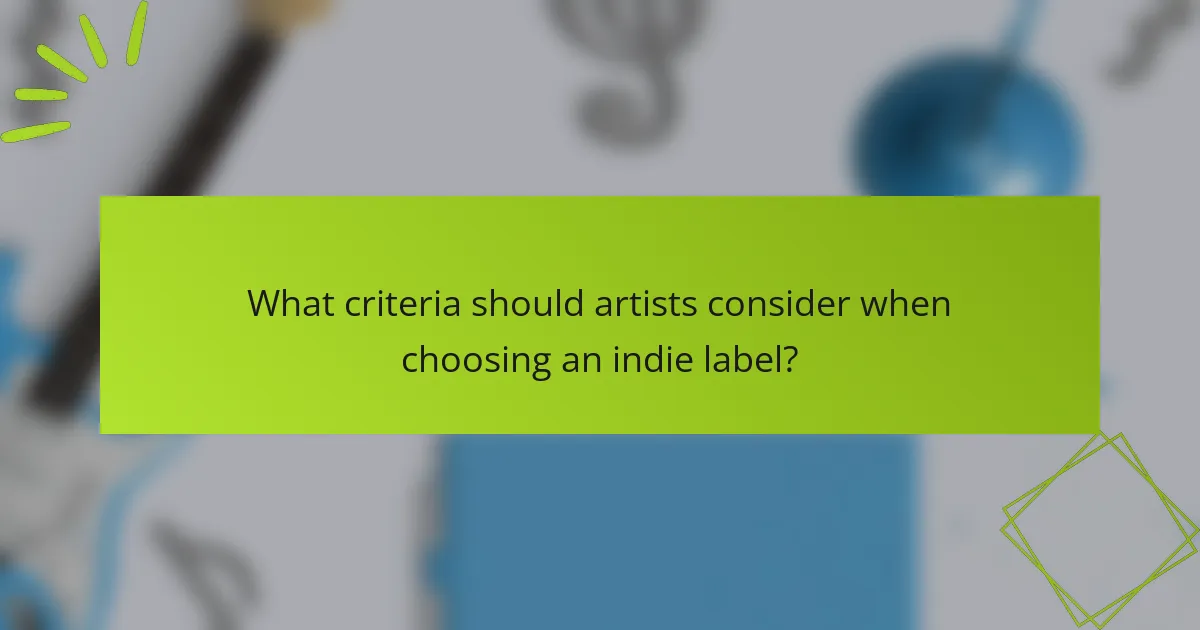
What criteria should artists consider when choosing an indie label?
Artists should evaluate several key criteria when selecting an indie label, including the label’s mission, the support services offered, and its distribution and promotion capabilities. These factors can significantly impact an artist’s growth and visibility in the music industry.
Label’s mission and values
Understanding the label’s mission and values is crucial for artists. A label that aligns with an artist’s artistic vision and personal beliefs can foster a more authentic partnership. Look for labels that prioritize diversity, inclusivity, and community engagement, as these values can enhance an artist’s reach and resonance with audiences.
Research the label’s history and its roster of artists to see if they share a similar ethos. This alignment can lead to more effective collaboration and promotional efforts.
Artist support services
Indie labels often provide various support services that can be vital for an artist’s development. These may include access to professional recording facilities, marketing assistance, and guidance on songwriting and production. Evaluate what specific services the label offers and how they can benefit your career.
Consider asking current or former artists about their experiences with the label’s support. A label that actively invests in its artists’ growth can make a significant difference in achieving success.
Distribution and promotion capabilities
Distribution and promotion are essential for getting music heard. Assess the label’s distribution network to ensure that your music will reach key platforms and audiences. A strong indie label should have established relationships with digital streaming services, radio stations, and other media outlets.
Inquire about the label’s promotional strategies, including social media marketing, press outreach, and live event planning. A label that excels in these areas can help amplify your music and expand your fan base effectively.
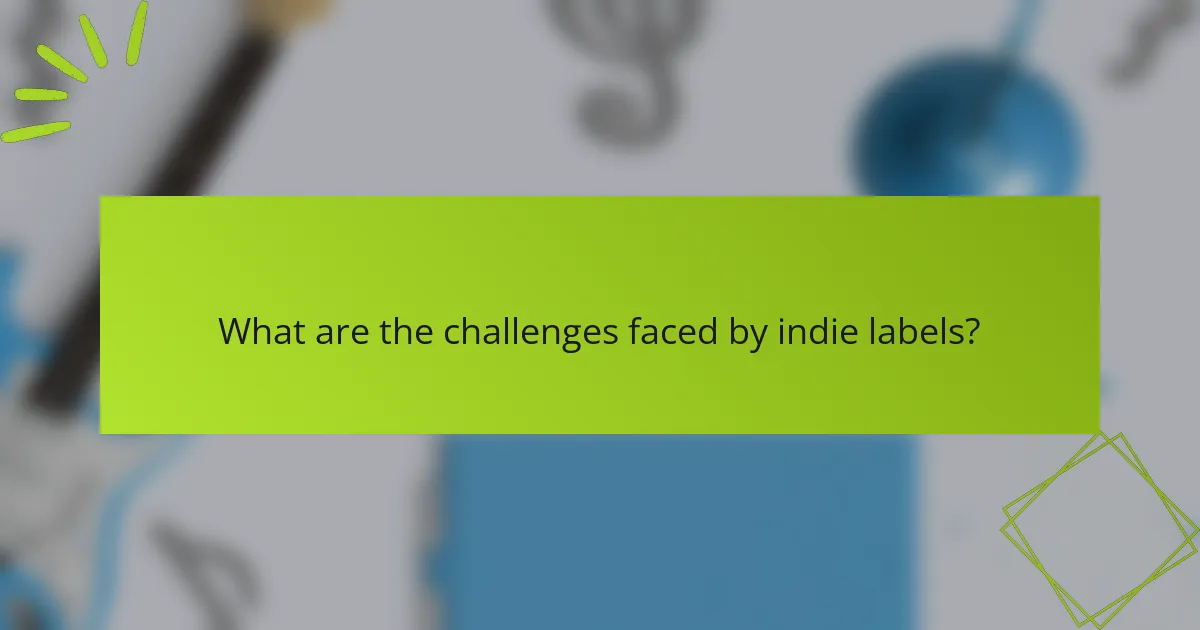
What are the challenges faced by indie labels?
Indie labels encounter several challenges that can hinder their growth and impact in the music industry. Key issues include limited financial resources, competition from major labels, and difficulties in marketing and distribution.
Financial Constraints
Many indie labels operate on tight budgets, which can restrict their ability to invest in artist development, marketing campaigns, and production quality. This financial limitation often leads to difficult decisions about which projects to prioritize.
To navigate these constraints, indie labels can seek alternative funding sources, such as crowdfunding or partnerships with local businesses. Establishing a clear budget and focusing on cost-effective marketing strategies can also help maximize limited resources.
Competition with Major Labels
Indie labels face stiff competition from major labels that have more extensive resources and established networks. This disparity can make it challenging for indie artists to gain visibility and secure lucrative opportunities.
Indie labels can differentiate themselves by promoting unique sounds and diverse talent that major labels may overlook. Building strong relationships with local venues and leveraging social media for grassroots marketing can enhance their competitive edge.
Marketing and Distribution Challenges
Effective marketing and distribution are critical for indie labels, yet they often lack the infrastructure that major labels possess. Limited access to mainstream media and distribution channels can hinder an indie label’s ability to reach broader audiences.
To overcome these challenges, indie labels should focus on building a robust online presence through social media and streaming platforms. Collaborating with influencers and utilizing targeted advertising can also help increase visibility and drive sales.
